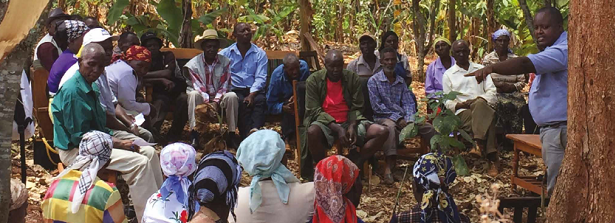Agribusiness-based advisory services (ABAS) project – report and workshop

In many developing countries, agribusinesses are highly engaged in providing services to small-scale farmers, including agricultural advisory or extension services. Yet, the phenomenon of agribusiness-based advisory services (ABAS) has received little attention in the study of and discourse on advisory services. KIT, Agriterra, Moyee Coffee, and the Food & Business Knowledge Platform have therefore joined hands in a learning trajectory that studied advisory service delivery to small-scale farmers by agri-businesses.
The organizing parties looked into questions such as:
- How do agribusinesses organize the collection, processing and use of feedback from farmers to improve advisory services?
- How is long term sustainability of advisory services achieved?
- What are key factors contributing to adoption and non-adoption by farmers and how can these be addressed?
- What are the development outcomes of advisory services at farmer level?
During the learning trajectory, that ran from September 2017 until May 2018, the organizing parties together with a reference group co-designed the approach, identified interesting cases to study and updated each other on progress and intermediary results. Recently they published the report ‘Understanding Agribusiness-based advisory services; findings from a learning trajectory’ discussing the results of the learning trajectory including the above-mentioned key questions. The approach and main findings were further discussed with a broad group of interested parties during a workshop held on June 19, 2018 in The Hague.
Learning from feedback from farmers
While generally attaching considerable importance to farmer-specific information to improve business strategies and target services and products, agribusinesses pay relatively little attention to mobilising systematic feedback from farmers on advisory services. To understand the effectiveness and performance of such services, most agribusinesses rely on data collected for general business purposes, such as on volume and quality of produce sold to the agribusiness, or type, quality and volume of products bought. There are, however, important limitations in using such data to assess their advisory services. There are ways that Agribusinesses can improve the effectiveness of their advisory services for example by more systematically generating feedback from farmers on the services provided or ensuring farmers’ feedback available among staff is captured and processed well.
Sustainability of services
Results show that all agribusinesses underlined the importance and benefits of advisory services for their core business, though often without being able to compare effectively these benefits with costs incurred. The fact that the costs of these services are covered from the main business of course contributes to their sustainability. Agribusinesses could learn from the efforts of some of the companies and cooperatives discussed to make the (management of the) costs of advisory services more explicit, allowing for well-founded choices as well as external transparency.
Understanding and addressing non-adoption
Behind the question of (partial) adoption and non-adoption, complex processes at farmer level and beyond play a role. About half of the agribusinesses comprehensively analyse the reasons for partial or non-adoption. For other agribusinesses, there is scope to deepen their analysis and understanding. Many agribusinesses use a wide range of both permanent and temporary incentive systems to encourage farmers to apply recommended practices and use their products. These generally seem to be effective. When incentives are given for limited periods of time, their effect is likely to be only short in term.
Development outcome
The evidence reviewed suggests that ABAS lead to significant improvements in the productivity of the commodities targeted and to commodity-related farmer income. The few studies that look at outcomes in terms of income changes at the household level find increases at this level too. Very few agribusinesses themselves look systematically at the impact of their advisory services. Some argue that monitoring and assessing impact is a complicated task beyond the scope of their work.
However, as customers as well as the general public are increasingly interested in knowing not only the source of agricultural produce but also how it is being produced and the impact this has on farmers, several innovative agribusinesses are investing in monitoring and widely sharing relevant information. Generally, agribusinesses reach farmers engaged in market-oriented agriculture and producing commodities of interest to agribusinesses. This also demarcates the potential development outcomes of ABAS.
Conclusion
Advisory services of agribusinesses are potentially important mechanisms for small and particularly medium farmers to improve the way they farm, increase the volume and quality of production and enhance their livelihoods. Important limitations relate to their reach—they cover only specific geographical areas and work only with already market-oriented farmers (men and women)—and their focus—attention is often on only one or a few commodities, ignoring (impacts on) other parts of the farming system. Overall, agribusinesses can improve their advisory services by making service provision—the delivery mechanisms, their quality, adoption, costs and impact— an explicit agenda item. This means moving beyond the assumption that their advisory services work, to develop a basic but solid theory of change and related business plan for the advisory services, and monitoring these to improve them further.
Please download the full report here.
Please download the 4-pager here.
Workshop “Understanding Agribusiness Based Advisory Services”
Please find below links to the agenda, PowerPoint Presentations and key conclusions of the workshop on June 19, 2018.
- “Understanding Agribusiness Based Advisory Services – the learning trajectory” agenda and introduction to the meeting, by KIT, Moyee Coffee and Agriterra
- “Understanding Agribusiness Based Advisory Services – the findings” by KIT, Moyee Coffee and Agriterra
- “Knowledge transfer – the East-West Seed approach”, by Rutger Groot of East-West Seed
- “Improving cooperative advisory services – from theory to practise” by Bertken de Leede of Agriterra
- “Understanding Agribusiness Based Advisory Services – Workshop summary” by KIT, Moyee Coffee and Agriterra






